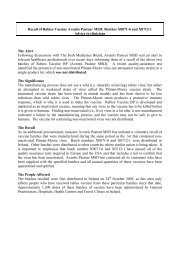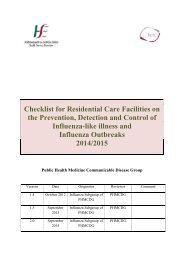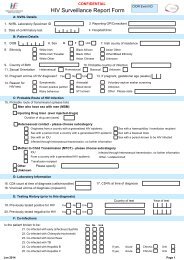VRE information leaflet for patients
VRE information leaflet for patients
VRE information leaflet for patients
You also want an ePaper? Increase the reach of your titles
YUMPU automatically turns print PDFs into web optimized ePapers that Google loves.
<strong>VRE</strong><br />
Vancomycin<br />
Resistant<br />
Enterococci<br />
<strong>VRE</strong><br />
Vancomycin<br />
Resistant<br />
Enterococci<br />
For More<br />
In<strong>for</strong>mation<br />
www.hse.ie<br />
<strong>VRE</strong> <strong>in<strong>for</strong>mation</strong> <strong>leaflet</strong><br />
<strong>for</strong> <strong>patients</strong>
<strong>VRE</strong><br />
Vancomycin<br />
Resistant<br />
Enterococci<br />
What is <strong>VRE</strong><br />
<strong>VRE</strong> are bugs (bacteria) that live in the bowel and<br />
that cannot be treated by certain antibiotics, such<br />
as vancomycin. <strong>VRE</strong> stands <strong>for</strong> Vancomycin Resistant<br />
Enterococci.<br />
Can <strong>VRE</strong> be harmful<br />
For most <strong>patients</strong>, <strong>VRE</strong> lives harmlessly in the bowel<br />
and does not cause infection. However, sometimes <strong>VRE</strong><br />
can cause infection in <strong>patients</strong>, <strong>for</strong> example when they<br />
need intensive care or while receiving chemotherapy.<br />
Antibiotics are needed to treat <strong>VRE</strong> infection. <strong>VRE</strong> can<br />
cause infections, such as kidney infections, wound<br />
infections or in severe cases, blood infection. If a<br />
patient is more vulnerable to infection and the infection<br />
is caused by <strong>VRE</strong>, it can be difficult to treat, because<br />
many of the commonly used antibiotics will not work<br />
against <strong>VRE</strong>. Doctors need to know as soon as possible<br />
if a patient is carrying <strong>VRE</strong> so that the most effective<br />
antibiotics can be chosen to treat the infection.<br />
How do people get <strong>VRE</strong><br />
Patients who have already taken lots of<br />
antibiotics are more at risk of picking up <strong>VRE</strong>.<br />
The reason <strong>for</strong> this is that the bugs are more<br />
exposed to antibiotics, and are there<strong>for</strong>e more<br />
likely to develop ‘resistance’ to that antibiotic, so that<br />
antibiotic no longer works.<br />
<strong>VRE</strong> can be carried by <strong>patients</strong>, healthcare staff or<br />
visitors, either harmlessly or if they are infected with it.<br />
It can spread between <strong>patients</strong> through direct contact<br />
with each other or by touching items or surfaces that<br />
the person with <strong>VRE</strong> may have touched, such as bed<br />
rails, toilets or equipment. As <strong>patients</strong> in hospital are much<br />
more vulnerable to infection than <strong>patients</strong> in their own<br />
homes, special precautions are required to prevent the<br />
spread of <strong>VRE</strong> between <strong>patients</strong> in hospital.<br />
What are the special precautions <strong>for</strong><br />
<strong>patients</strong> with <strong>VRE</strong><br />
Special precautions have been designed to prevent <strong>VRE</strong><br />
spreading between <strong>patients</strong> on the ward. If you have a<br />
positive test result <strong>for</strong> <strong>VRE</strong>, a careful check will be done to<br />
decide if you need to be cared <strong>for</strong> in an isolation room with<br />
your own toilet or commode. If <strong>VRE</strong> is picked up in a wound<br />
swab or from urine taken from a urinary catheter or if<br />
you have diarrhoea, you may be cared <strong>for</strong> in an<br />
isolation room.<br />
<strong>VRE</strong> does not cause diarrhoea but because it<br />
lives in the bowel, it may be spread more<br />
easily if you are suffering with diarrhoea.<br />
Staff will wear gloves and aprons be<strong>for</strong>e<br />
coming into contact with you, to protect their<br />
hands and clothes from <strong>VRE</strong>. Patients, staff<br />
and visitors must pay special attention to hand<br />
hygiene. All staff must clean their hands be<strong>for</strong>e<br />
and after any contact with every patient, regardless of<br />
whether or not they have <strong>VRE</strong>. If visitors are helping<br />
out with your physical care, nursing staff will advise<br />
if extra precautions are required, such as wearing<br />
gloves and aprons.<br />
How can I help<br />
If you go to the doctor, another clinic, hospital or nursing<br />
home, let them know you have had a positive <strong>VRE</strong> result.<br />
They can then take special precautions to stop <strong>VRE</strong> spreading<br />
to other <strong>patients</strong> who might be more prone to getting a <strong>VRE</strong><br />
infection.<br />
What happens when I’m ready to leave<br />
hospital<br />
You can go home as soon as your doctor says you are<br />
ready, even if you have <strong>VRE</strong>. Carrying <strong>VRE</strong> will not affect<br />
your discharge. If you are going to another hospital or<br />
nursing home, your nurse or doctor will let them know<br />
about your positive <strong>VRE</strong> result so that they can take<br />
measures to prevent it spreading to other <strong>patients</strong>.<br />
What happens when I go home<br />
There is no need to take special precautions at home.<br />
People in the community are usually fit and healthy<br />
so they are less likely than hospital <strong>patients</strong> to<br />
pick up <strong>VRE</strong>. Clothes, bed linen and dishes can be<br />
washed as usual. It is always very important to<br />
wash your hands carefully after using the toilet<br />
and be<strong>for</strong>e preparing meals or eating to stop<br />
bugs spreading to other people. Clean hands<br />
protect you and others from lots of infections, not<br />
just <strong>VRE</strong>.<br />
Will I get rid of <strong>VRE</strong><br />
Your body may clear <strong>VRE</strong> from the bowel as you recover,<br />
but this is not always the case, and it may remain in the<br />
bowel <strong>for</strong> some time. Taking antibiotics can encourage <strong>VRE</strong><br />
to grow in the bowel again, so they should only be taken<br />
<strong>for</strong> a very good reason. Antibiotics are available to treat<br />
<strong>VRE</strong> infection but they will not clear <strong>VRE</strong> from the bowel.<br />
Please do not hesitate to ask the nursing or medical staff<br />
caring <strong>for</strong> you if you have any questions or if<br />
you require more <strong>in<strong>for</strong>mation</strong> about <strong>VRE</strong>.
















